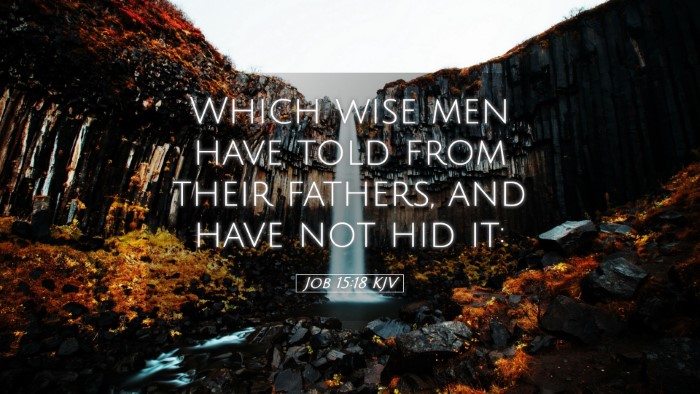Commentary on Job 15:18
Job 15:18 states: "Which wise men have told from their fathers, and have not hid it." This verse serves as a pivotal moment in the Book of Job, revealing the themes of wisdom, tradition, and the integrity of knowledge passed down through generations. The discourse on this verse entails a profound examination of human understanding in the face of divine providence.
Contextual Overview
The verse is part of Eliphaz's response to Job's lamentation regarding his suffering and maintain his innocence before God. Eliphaz, representing the conventional wisdom of his time, asserts the traditional views regarding suffering, retribution, and divine justice. His statements are not merely his own; he claims they are grounded in the wisdom passed down through the ages.
Insights from Public Domain Commentaries
Matthew Henry's Commentary
Matthew Henry explains that Eliphaz is emphasizing the reliability of ancestral wisdom. He notes that the thoughts shared are not novel or self-fabricated but have been conveyed from generations of wise men. Henry points out that the wisdom of past generations should be respected, as it is rooted in experience and a deeper understanding of God’s ways. In this context, Eliphaz implies that true wisdom aligns with the traditional view that suffering is a direct result of sin.
Albert Barnes' Notes on the Bible
Albert Barnes comments extensively on the notion of wisdom derived from tradition. He states that "wise men have told from their fathers" signifies a deep reliance on the teachings that have endured the test of time. Barnes adds that the essence of these teachings is often to guide individuals towards understanding their situations through the lens of divine justice. Furthermore, he underscores that the failure to conform to these teachings, particularly in Job’s case, is indicative of a deviation from established truth.
Adam Clarke's Commentary
Adam Clarke elaborates on the implications of knowing and passing down wisdom. He emphasizes that wise men have always sought to communicate the truths about human suffering and divine retribution. Clarke argues that the advice from elderly sages carries weight, and those who stray from this wisdom may find themselves in dire consequences, just as Eliphaz suggests Job. Clarke focuses on the importance of communal knowledge, indicating that wisdom is often collective and not an individual pursuit.
Theological Reflections
A deeper theological reflection on Job 15:18 raises questions about the nature of wisdom and its implications for faith. Wisdom in the Bible often embodies both knowledge and experiential understanding. The reliance on ancestral teachings highlights the importance of community and tradition in shaping one's faith and morals.
Additionally, the assertion made by Eliphaz serves a dual purpose: while it honors tradition, it simultaneously challenges Job by implying his beliefs diverge from accepted truth. This tension points to a broader discourse on the interplay between personal experience and communal wisdom in spiritual matters.
Practical Applications
-
Encouragement to Seek Wisdom:
Church leaders and scholars are urged to seek wisdom not only from Scripture but also from the teachings of faithful men and women throughout history.
-
Valuing Tradition:
Even as modern interpretations and understandings of theology evolve, honoring the traditions that have shaped faith communities can offer valuable insights.
-
The Importance of Passing Down Knowledge:
Pastors and educators are reminded of their duty to impart wisdom to the next generation, ensuring that essential truths are not lost.
-
Understanding Suffering:
Job’s narrative continues to challenge preconceptions about suffering; a careful study of these teachings invites deeper inquiry into God’s nature and justice.
Conclusion
In conclusion, Job 15:18 serves as a reminder of the significance of wisdom and the responsibility that accompanies it. By acknowledging the wisdom of the past, we are equipped to navigate the complexities of faith and suffering in the present. This verse calls on all believers to reflect on how scriptural truths and ancestral wisdom shape our understanding of God’s workings in our lives.


